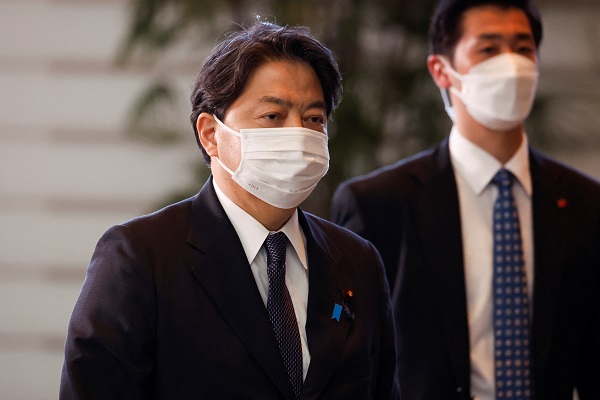 Japan's Foreign Minister Yoshimasa Hayashi arrives at Prime Minister Fumio Kishida's official residence in Tokyo, Japan on 10 August 2022.;
Credit: REUTERS/Issei Kato
Japan's Foreign Minister Yoshimasa Hayashi arrives at Prime Minister Fumio Kishida's official residence in Tokyo, Japan on 10 August 2022.;
Credit: REUTERS/Issei Kato
TOKYO (Reuters) - On Wednesday 10 August 2022, Japan's Prime Minister Fumio Kishida reshuffled his cabinet, removing some ministers with links to the Unification Church to reverse a plunge in public support triggered by the ruling party's ties to the controversial group; Kishida, in office since last October, announced his new government team in a shake-up that came earlier than analysts had expected.
While key personnel like foreign minister Yoshimasa Hayashi and finance chief Shunichi Suzuki held on to their posts, some high-profile ministers were removed, including Nobuo Kishi, the younger brother of slain former premier Shinzo Abe. Also leaving his post was industry minister Koichi Hagiuda, who took up a leadership position in the ruling Liberal Democratic Party (LDP) instead.
In the month since Abe was gunned down, a spotlight has been turned on the LDP's long-standing ties to the Unification Church, with polls showing declining approval ratings for Kishida and respondents citing a need to know how close those ties might be. "He's basically doing damage control," said political commentator Atsuo Ito. "What people are really watching is the Unification Church."
Abe's suspected killer has said his mother was a Unification Church member bankrupted by donating to it, and blamed Abe for promoting it.
In the latest survey, Kishida's support had fallen to 46% from 59% just three weeks ago, public broadcaster NHK said on Monday, the lowest rating since he became prime minister.
The religious group itself is set to hold a rare news conference with foreign media late on Wednesday.
Hagiuda, the trade minister, became head of the LDP's policy research council, a heavyweight job in the party. That appointment is seen as an attempt to appease members of the Abe faction, the party's biggest, though Hagiuda has publicly acknowledged attending an event held by a Unification Church-related group.
Analysts said their impression was that Kishida had taken pains to maintain balance in the faction-ridden party by choosing roughly equal numbers of ministers from different groups. But commentator Joji Harano thought Kishida might have carried out the reshuffle too fast, trying to hard to please everybody. "I think he could have perhaps done better to show his own direction and make the overall line-up fresher," he added.








